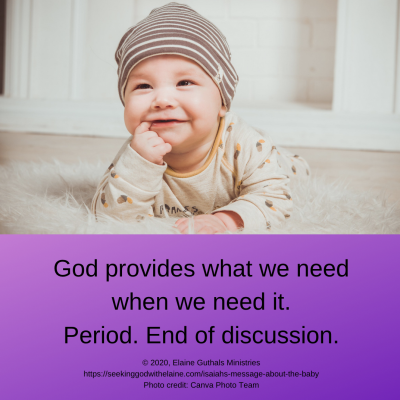We know that Isaiah 7: 16 is a prophecy about Jesus’ birth. However, most prophecies in Scriptures not only gave us a clue as to what would happen in the future, but it also dealt with whatever they were going to face at the time. This daily devotional looks at the prophecy with which Ahaz would have been concerned.
Nuggets
- When God makes a pronouncement in Scriptures, it usually dealt with whatever they were going to face then as well as gave us a clue as to what would happen in the future.
- The term virgin meant something different than what we think.
- The focus should be on Jesus as this life isn’t the priority.
- God requires that each of us make a decision for or against Him.
Devotions in the Isaiah’s Message from Sovereign God series

In the last devotion, we talked about how there was a threat from Aram and Israel to overthrow Judah. Ahaz was the king at the time, but he wasn’t a good king.
That didn’t stop God. Evil king or not, God still stepped in. There was still a remnant that was faithful to Him.
Let's Put It into Context
“Therefore, the Lord himself will give you a sign: See, the virgin will conceive, have a son, and name him Immanuel” (Isa. 7: 14 CSB)
God was wanting to give Ahaz a sign. A baby was going to be born to a virgin that would would bring God to us. We know this was ultimately fulfilled with the birth of Jesus.
Who Is the Baby?
“By the time he learns to reject what is bad and choose what is good, he will be eating curds and honey” (Isa. 7: 15 CSB).
But think about it this way. When God makes a pronouncement in Scriptures, it usually dealt with whatever they were going to face then as well as gave us a clue as to what would happen in the future.
Case in point, when the disciples asked about the when Christ’s kingdom would come. “While he was sitting on the Mount of Olives, the disciples approached him privately and said, ‘Tell us, when will these things happen? And what is the sign of your coming and of the end of the age?’” (Mt. 24: 3 CSB).
We know that Jesus was not only talking about the destruction of Jerusalem, which would happen in the not so distant future, but He was also talking about His second coming. A lot of the prophesy did double duty like that.
To read devotions in the How Do We Know If We Don’t Know series, click the appropriate button below.
We’re going to focus on the prophecy in Ahaz’s time. We will focus on the Messianic prophesy during our Christmas series.
I know. That kind of is a kicker, isn’t it? How many times have we heard an argument would be, “You can’t be the Messiah because there was only one virgin birth?” Is this really saying there were more?
I never really hadn’t thought before that — if the prophesy was meant for right then — it sounds like there was another kid running around that was of a virgin birth.
Part of me is jumping up and down, screaming, “No! No! No! Can’t be!!!”
The other part is asking, would God be giving this prophesy when the Israelites really needed comforting if it was only going to be fulfilled 700 years in the future?
God provides what we need when we need it. Period. End of discussion.
I know. Then who was the baby?
Sweets threw out some options. It is a good read if you are interested.
Resource

Basically, some think Ahaz’s son Hezekiah; some think Isaiah’s son Shear-jashub is the fulfillment of the prophesy. Both are probably out, though, since they had already been born.
Kirkpatrick cautioned us that the term virgin meant something different than what we think. He wrote that virgin means “… would be more accurately rendered ‘damsel.’” It means a young woman of marriageable age, and is not the word which would be naturally used for virgin …”
Resource
We have to think about the significance of the name Immanuel, which was another kid of Isaiah’s. It means “God with us.
But Isaiah wasn’t focusing on God the Father being there to help them through this trial. He was saying a baby would be the sign to help them through this trial.
I think this is one of those things I am going to have to file in the I Don’t Understand folder and go on from here.
I see it as foretelling Jesus’ birth. I don’t know what I think about Hezekiah, Shear-jashub, or some other little dude at that time. I think it would be using Fitzpatrick’s definition, not an immaculate conception.
Also, I think this falls in the faith, believing, understanding category. God purposefully has included things in Scripture that we will never understand. We have to have the faith to believe that God is in control.
Bassett probably had the right view. He wrote, “It matters not whether it is near or far, the family and lineage of David must survive till then. Hence the sign was plain enough, or ought to have been, to Ahaz and the people in general.”
Resource
The focus should be on Jesus. This life isn’t the priority.
Well, maybe that was the focus. Maybe God was giving Ahaz a chance to mend his ways. What would he have had to do to mend his sinful ways?
- Stop the idol worship
- Break up the relationship with the Assyrian monarchy
- Return what he had appropriated from the temple treasure.
Resource
We keep saying this. Repentance isn’t just about saying, “We’re sorry. Forgive us.” It is about saying, “I am giving up my sinful ways. I am going to follow Your laws and commandments.”
What better time for Ahaz to turn than now? Ahaz only had to trust God.
What Does the Sign to Ahaz Really Mean?
“For before the boy knows to reject what is bad and choose what is good, the land of the two kings you dread will be abandoned. The Lord will bring on you, your people, and your father’s house such a time as has never been since Ephraim separated from Judah: He will bring the king of Assyria” (Isa. 7: 16-17 CSB).
Oh, okay. This makes me feel better. The boy who would be the sign isn’t going to have to do anything except be born.
Verse 16 says, “For before the boy knows to reject what is bad and choose what is good …” (Isa. 7: 16 CSB). That tells me that the Israelites could do nothing to stop this invasion from happening.
God requires that each of us make a decision for or against Him. Are we going to submit our lives to Him, or are we going to continue a sinful lifestyle under Satan?
If we throw in with Satan, there will be consequences. The only way we escape those consequences is to ABCD.
The ABCDs of Salvation
If you have not become a believer in Christ, please read through the
Plan of Salvation and prayerfully consider what God is asking you to do.
A – admit our sins
B – believe His Son Jesus is our Redeemer
C – confess God as Sovereign Lord
D – demonstrate that commitment by making any changes needed in our lives to
live the way in which God has called us
The Disciple’s Job Description
The rest of the passage is mud. Let’s work through this.
Assur was the capital of the Assyrian Empire. Ahaz did open the door for an Assyrian invasion. It took a long time for them to be an independent state again.
God sometimes let us know what is going to happen. He might dribble it out in stages, though, instead of dumping it all on us at once.
If you read the rest of the verses, it talks about Israel being overrun. We know they were.
It gets back to, even though they are God’s chosen people, they are going to have to suffer the consequences of their sins. God will use any and all people necessary to inflict the punishment on us.
Bertram reminded us that, whatever punishment God does inflict on us, He has an even more terrible one in the wings. He is going to correct us until we figure out how He wants us to live.
Resource

Making the Connections
Yes, God does makes things so we don’t understand. He does not, however, make things not understandable.
We have to reason things out so we can make the decision to ABCD. We aren’t going to make that decision if we aren’t in a place where we can say, “I don’t understand it all, but that is okay.”
God loved us enough to send His only Son to die for us. He loves us enough to correct us. He loves us enough to not dilute His character to come down to our level.
Did you catch that this all started out with alliances? Ahaz was in an alliance with Assyria, so he didn’t want to be in an alliance with Adam and Israel.
We have to watch with whom we are associating. Are our friends pointing us to God, or are they encouraging us to turn away from Him?
To read a related devotion, click the button below.
How Do We Apply This?
• First of all, we have to ABCD.
• We’ve got to fully submit to Him in all areas of our lives.
• We’ve got to obey God’s directions — even if we don’t fully understand them.
Father God. We are so self-centered. We think we have to know every little piece of the puzzle. We don’t. All we need to do is acknowledge that You are Sovereign God. You are in control of everything, not us. We thank You that, regardless of how that prophecy was applied in Isaiah and Ahaz’s time, You were telling us that You would be with us. You would be providing a plan for our salvation. Lord, we want our relationships with You restored. We want to be changed so that we are more like You. We submit to You. Amen.
What do you think?
Leave me a comment below (about this or anything else) or head over to my Facebook group for some interactive discussion.
If you don’t understand something and would like further clarification, please contact me.
If you have not signed up for the email daily or weekly providing the link to the devotions and the newsletter, do so below.
If God has used this devotion to speak with you, consider sharing it on social media.
Pingback: Isaiah’s Message on Living for God – Seeking God with Elaine
Pingback: The Prophecy of the Virgin Birth – Seeking God with Elaine
Pingback: Isaiah’s Message on God’s Purpose – Seeking God with Elaine
Pingback: The Act of Standing Morally – Seeking God with Elaine